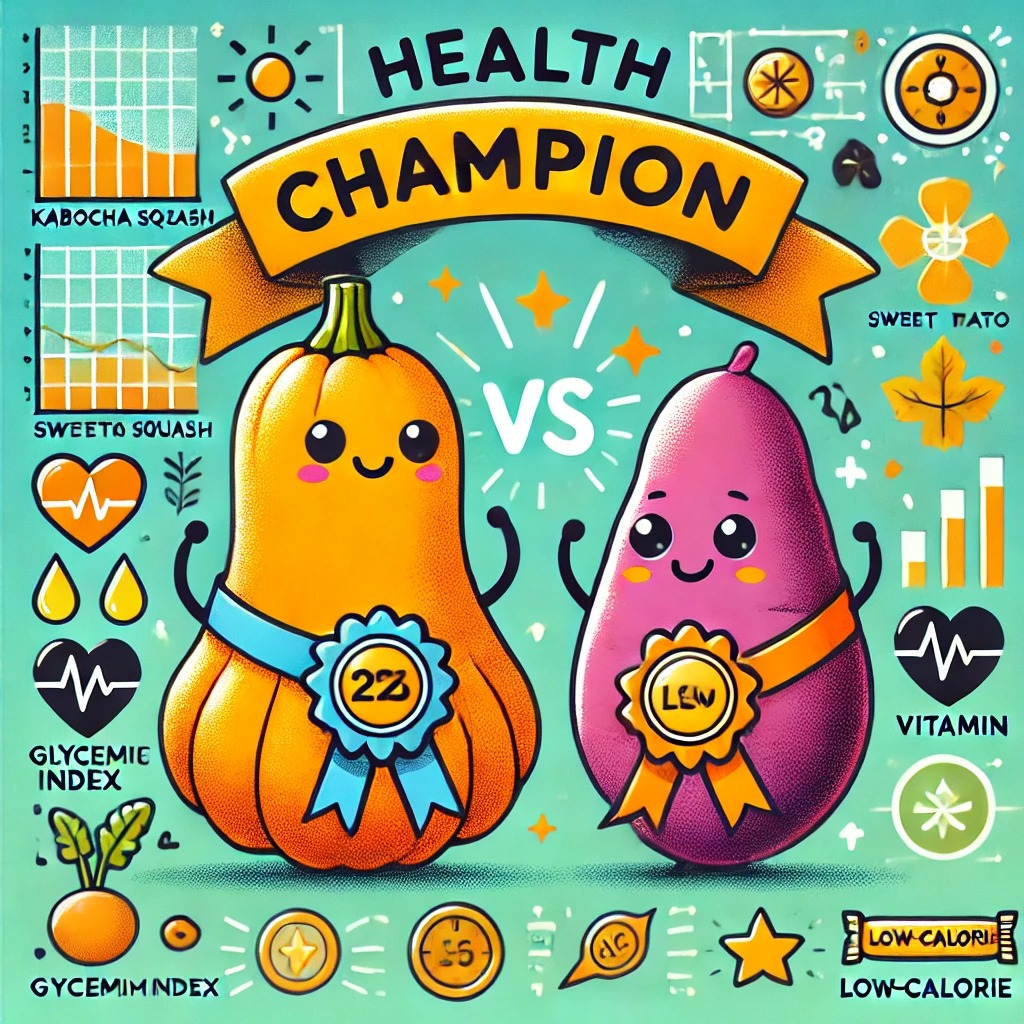Your cart is currently empty!
Kabocha Squash vs. Sweet Potato
Kabocha Squash vs. Sweet Potato: The Battle of the Sweet Spuds
Let’s talk about the underdog (or under-squash) of the vegetable aisle: kabocha squash. This greenish, slightly unassuming cousin of butternut squash has a lot going for it. In fact, it might just outshine the beloved sweet potato—and no, we’re not just saying that to ruffle some root vegetable feathers. Here’s why kabocha squash might be the smarter choice for your plate.

1. The Sweet Spot for Flavor
If sweet potatoes are the sugar-loving extroverts of the veggie world, kabocha squash is their milder, sweeter, more sophisticated sibling. Its natural sweetness doesn’t hit you over the head; it’s like the friend who knows how to season a joke without being over the top. Plus, kabocha’s creamy texture makes it feel indulgent, even when it’s not.
2. Lower Glycemic Index = Friendlier to Your Blood Sugar
Sweet potatoes are fantastic, but they’re not shy about their sugar content. That natural sweetness comes with a higher glycemic index, meaning they can cause your blood sugar to spike faster. Kabocha squash, on the other hand, has a lower glycemic index, making it a gentler choice for your blood sugar. If you’re managing diabetes or just trying to avoid sugar crashes, kabocha wins this round.
3. Fewer Calories, More Flavor
At 40 calories per cup compared to sweet potato’s 86 calories per cup, kabocha squash is basically the veggie equivalent of “eating dessert without the guilt.” It’s like going to a party and finding out the cake is also low-calorie. Jackpot.
4. Lower Carbs, High Fiber
Sweet potatoes are undeniably carb-heavy. While that’s great for athletes or anyone carb-loading, it’s not ideal if you’re watching your carb intake. Kabocha squash provides fewer carbohydrates while still offering a good amount of fiber, which keeps you full and happy. It’s like the perfect wingman: it doesn’t steal the spotlight, but it always has your back.

5. Nutrients Galore
Both kabocha squash and sweet potatoes are packed with vitamin A and C, but kabocha manages to bring the goods without all the extra sugar. Vitamin A supports eye health, while vitamin C boosts your immune system—so you can see clearly and fend off colds while enjoying a bowl of roasted kabocha.
6. The Versatility Factor
Sweet potatoes have their moments (hello, sweet potato fries), but kabocha squash is the quiet multitasker of the kitchen. It can be roasted, pureed, added to soups, or even turned into a silky sauce. Plus, you can eat the skin—bonus points for being low-maintenance.
The Verdict: Kabocha Squash, the Silent Superstar
While sweet potatoes will always have a place in our hearts (and on Thanksgiving tables), kabocha squash is the veggie hero we didn’t know we needed. It’s mild, nutrient-packed, and easy on the carbs and calories, all while being kinder to your blood sugar. In short, it’s the overachiever of the squash world, quietly doing all the things sweet potatoes do—just better.
So, next time you’re in the produce aisle, give kabocha squash a chance. Your taste buds (and blood sugar levels) will thank you. Plus, who doesn’t want to eat a veggie that doubles as a health hack?


